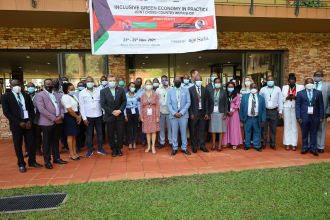EEU Seminar - Knut Einar Rosendahl
On the 13th of December, Knut Einar Rosendahl will present his research during the EEU seminar, which will be the final EEU Seminar this semester. He is a professor at Norwegian University of Life…
On the 13th of December, Knut Einar Rosendahl will present his research during the EEU seminar, which will be the final EEU Seminar this semester. He is a professor at Norwegian University of Life…

A three-day workshop focusing on National Policy Reviews and training has been opened at the Speke Resort Hotel Munyonyo in Uganda. Over forty researchers and policymakers from Sweden, Uganda, Kenya…
This study analyzes the factors that have facilitated Vietnam's recent rapid solar and wind power expansion and draws policy insights for other member states of the Association of Southeast Asian Nations (ASEAN). A policy-mix analysis focusing on targets, incentive instruments, enabling regulations, and policy implementation is carried out, informed by semi-structured interviews with 20 Vietnamese experts during the period January–March 2021. A comparative analysis between Vietnam and the other ASEAN countries provides policy insights.
This paper investigates options for carbon price adoption in Vietnam, with a focus on model designs capable of meeting the country's updated Nationally Determined Contribution (NDC). We employ an ex-ante policy evaluation across environmental, economic, social, and political dimensions, drawing on interviews with key stakeholders. A multi-criteria analysis is also pursued to provide an overall comparison across policy options.
This paper aims to examine the cross-correlation relationship between EU carbon market price and the economic policy uncertainty. The United Kingdom and the United State of America are chosen as the representative countries. We first conduct the linear analysis to explore the correlation of EU carbon market futures return with the economic policy uncertainty of the two countries. Our findings show that there is no linear correlation between EU carbon market return and economic policy uncertainty.
The next speaker in the EEU seminar series is Jan Steckel who is currently the head of Climate and Development working group at the Mercator Research Institute on Global Commons and Climate Change…

A recent report from the International Monetary Fund, IMF, underlines the urgency of ending the subsidies of fossil fuels and implementing carbon taxes globally. This report contains a global…
A recent report from the International Monetary Fund, IMF, underlines the urgency of ending the subsidies of fossil fuels and implementing carbon taxes globally. This report contains a global, regional and country-specific update. The message is very clear: The world needs a correct price on carbon that accounts for its real costs, but currently the development is heading the wrong way.
The chapter by Shoibal Chakravarty and E. Somonathan focuses on coal, which accounts for a whopping 64% of India’s CO2 emissions in 2021. Since coal combustion also releases other deadly pollutants and particulates, its elimination would have collateral local environmental benefits. The current tax accounts for 20–40% of the price of coal paid by coal-burning power plants, which the authors consider to be well below the level which would internalise even the local component of the pollution externality.
The climate targets agreed upon in the Paris Agreement will eventually need to be backed by ambitious climate policies. Putting a price on carbon and abolishing subsidies on fossil fuels is usually widely agreed upon by economists to be the economically efficient solution (High-Level Commission on Carbon Prices 2017). An increasing amount of countries, including low- and middle-income economies (LMICs), have already introduced (or plan to do so) carbon pricing schemes.